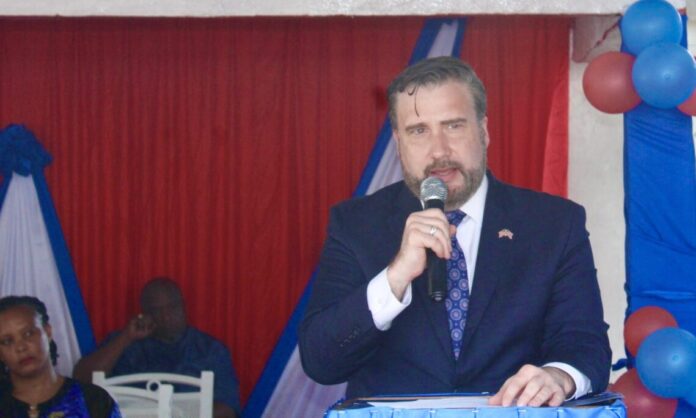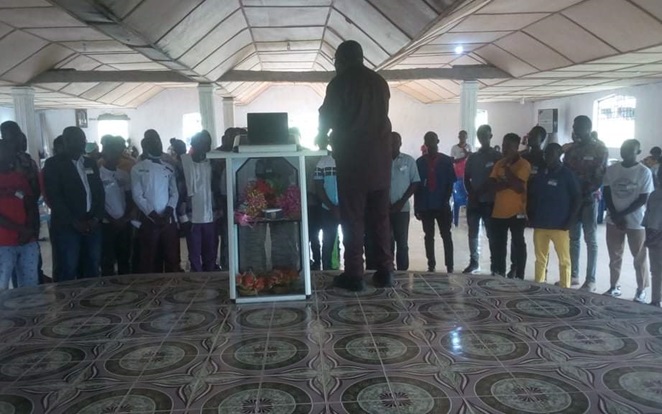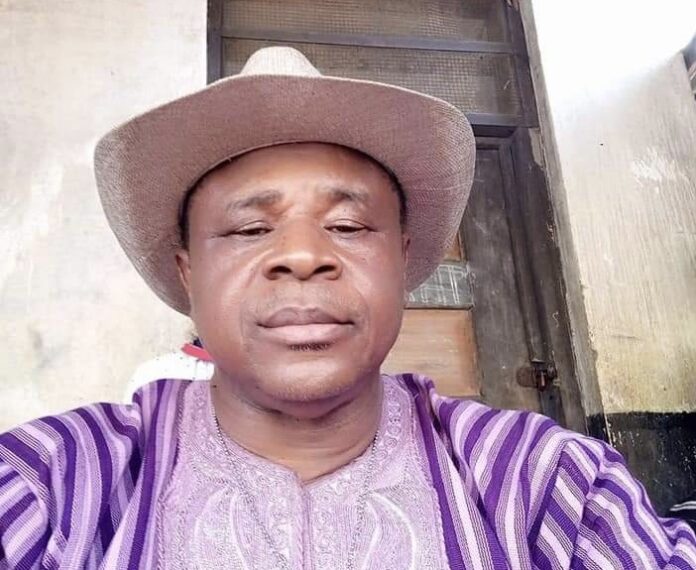LIBERIA – The George M. Weah Administration in Liberia has again been chastised by the Biden Administration over unending corruption in Government.
A State Department official on Tuesday minced no words when he spoke at the handover of the Liberia Security Network in Monrovia.
Deputy Assistant Secretary of State at the Bureau of International Narcotics and Law Enforcement Affairs Mr. Tobin Bradley re-echoed U. S. criticisms leveled at the Liberian Government over ending corruption in the West African country.
“…We also cannot ignore the role that corruption plays in undercutting success. Corruption destabilizes governments, undermines democracy, and provides openings for dangerous groups such as criminals, traffickers, and terrorists. It’s important that we confront this truth and act accordingly as if our future relies on it…,” the U.S. official noted at the program.
According to Mr. Bradley, the Liberia Security Radio Network will contribute to efforts of enabling civilian law enforcement and their partners to respond swiftly and effectively to threats.
On December 23, 2019, U.S. Congressman and Co-Chair of the Tom Lantos Human Rights Commission released a statement in which he said that, “… Human rights advocates are increasingly alarmed by the deterioration of civil and political rights and the corruption that is occurring in Liberia under President George Weah.,.”
At a bi-partisan Congressional hearing of the Human Rights Commission held on March 24, 2021, Representative Smith again fired off more criticism of the Weah-led Government when he stated, “… In Africa, we have a special relationship with Liberia, which was founded by freed American slaves. Unfortunately, President George Weah leads a kleptocratic Government that has engaged in political corruption from the day he assumed office by depleting the Government coffers for personal use while the people of Liberia suffer…”
A few days later, the charge of Congressman Smith was strongly rejected by a member of the ruling Coalition for Democratic Change (CDC) and a close ally of President Weah, Representative Acarous Gray of Montserrado County.
“…While Representative Smith is entitled to his own opinion, the same can’t be said about his own set of facts. My office categorically rejects these claims; they aren’t the true reflection of what the reality is in Liberia. The Representative has seemingly had a longstanding objection to Weah’s Presidency if one can judge from his pre-election remarks about the ruling CDC. And so it appears he’s opting to fulfill his prophecy…,” lawmaker Gray vehemently countered.
Earlier this year in February the head of the U.S. delegation at the celebration of Liberia’s Bicentennial – Special Assistant to the U.S. President Madam Dana Banks told President Weah and his officials to their faces that, “…Like many democracies, Liberia still has work to do to seriously address and root out corruption. We bring this up as your friends who are eager to help. Corruption is an act of robbery. It robs Liberia’s citizens of access to health care, to public safety, to education. It robs you of the healthy business environment we all know Liberia could have, which would lift countless Liberians out of poverty.
It subverts economic opportunity, exacerbates inequality, and erodes integrity. It eats away at the democracy you have worked so hard to build. Liberia has a host of anti-corruption institutions. But while these institutions are nominally and legally independent from the Government of Liberia, the truth is that the government fails to adequately fund them and exerts its influence upon them. Too many of Liberia’s leaders have chosen their own personal short-term gain over the long-term benefit of their country…,” the White House official said.
While the White House official’s statement was meant to prod the Weah Administration to trigger and sustain meaningful fiscal probity and good governance, it also signaled that Liberia’s long-time special ‘friend” – the U.S., was prepared to continue to be supportive of their strong and unique partnership.
The consistency of continued engagement and criticism of corruption in the Weah Government by U.S. Administration officials continued in April when former U.S. Ambassador to Liberia, who is now her country’s U.N. Ambassador Madam Linda Thomas Greenfield, spoke at a forum commemorating 200 years of U.S.-Liberia ties and remarked, “…Liberia has a serious problem right now, and that’s taking on a number of issues, foremost among them is the issue of corruption.
And this is an issue that we are seeing across the board, not just in Liberia, but in other places. And for me, corruption is an act of robbery, plain and simple. It’s a cancer in our societies. It is the government stealing from the people of Liberia, from the mouths of children. It takes away access to health care. It denies citizens their right to public safety. It stops young people of Liberia from getting the education they deserve.
It takes the future away from them. It prevents the country from having the healthy business environment that it needs to lift Liberians out of poverty. It has denied Liberia its place in history, a successful and prosperous country with so many resources to contribute to its people’s well-being…”
While critics of the Weah Administration have stepped up calls and activism in recent months for the Biden Administration to sanction those alleged to be involved in Government corruption, including the Liberian leader himself, Washington has refrained from telegraphing any future action against corrupt individuals.
A former director of Passports and Visas at Liberia’s Ministry of Foreign Affairs Andrew Wonplo, an incumbent lawmaker from the administrative district of Grand Cape Mount County in southwestern Liberia Senator Harry Varney Gboto-Nambi Sherman and former warlord turned incumbent lawmaker Senator Prince Johnson of Nimba County are all sanctioned by the U.S. government over charges of “significant corruption.”
In its 2021 Country Report on Human Rights Practices in Liberia – Section 4 (Corruption and Lack of Transparency in Government), the U.S. State Department charged that “…Corruption was a fact of daily life for citizens and businesses alike. According to the September Center for Transparency and Accountability in Liberia State of Corruption Report, 90 percent of citizens thought corruption was high in the country and 76 percent had witnessed corruption.
The report also labeled the national budget as a tool for corruption in which public resources end up in the pockets of public officials through direct payments, indirect payments, or backdoor deals. As noted earlier in Section 1.e., there was also reportedly widespread corruption in the judiciary, in the form of bribery and extortion where favorable decisions were bought or in the form of direct government influence over judicial decisions…”
Big financial scandals and allegations of pervasive corruption in Government have tainted the Weah Administration which has failed to strengthen and support integrity institutions which are on the forefront of the fight against corruption.
A top source in the Executive Mansion, who asked for anonymity, told African Star late on Tuesday in Monrovia that the sentiment among Presidential advisers was that it would be impossible to convince the Americans of any real progress at instituting economic and political reforms, especially with anemic support from influential U.S. Congressional and Administration officials.
The source said lack of technical capacity and unwillingness of the ruling CDC party to invite career professionals in the opposition to serve in Government has done a disservice to Government’s agenda. Source: African Star







